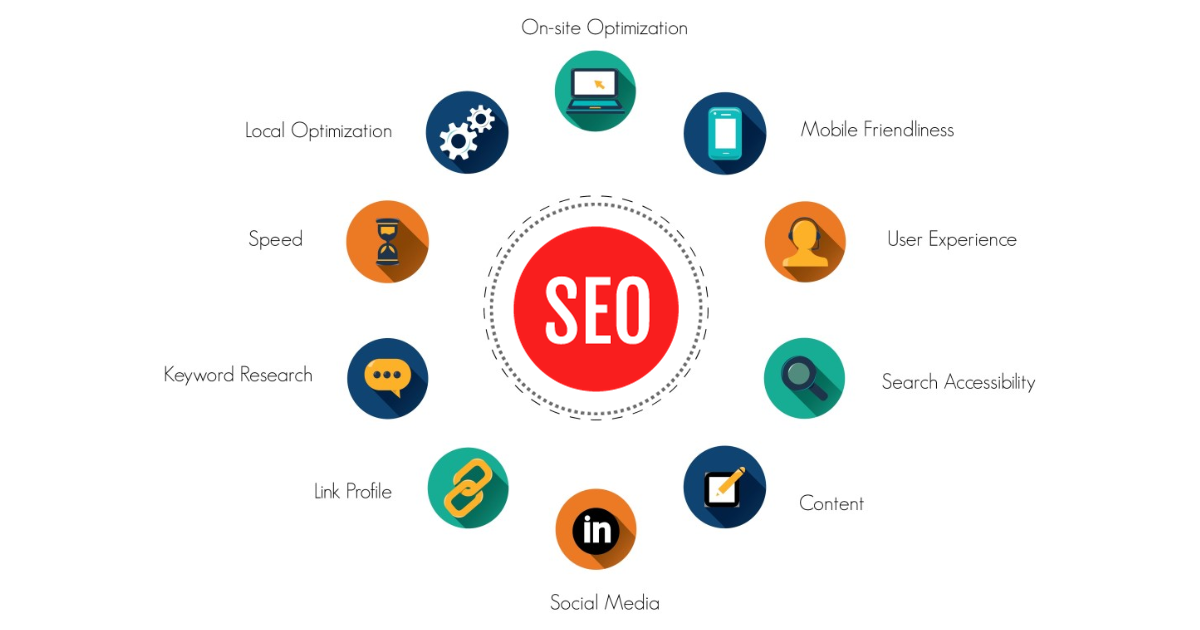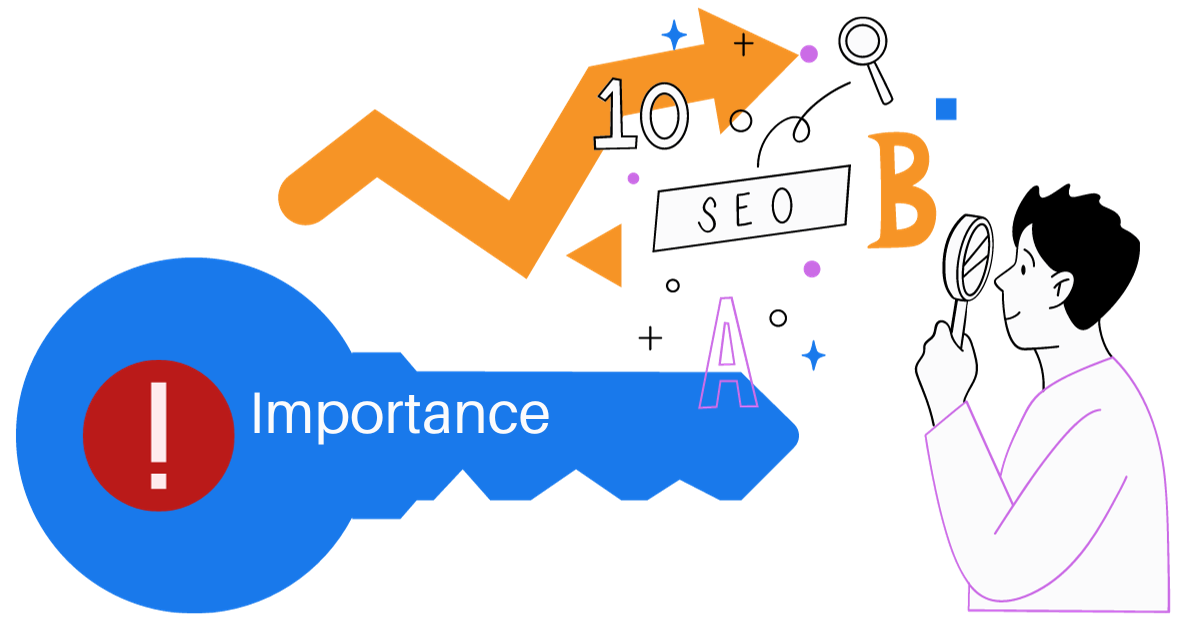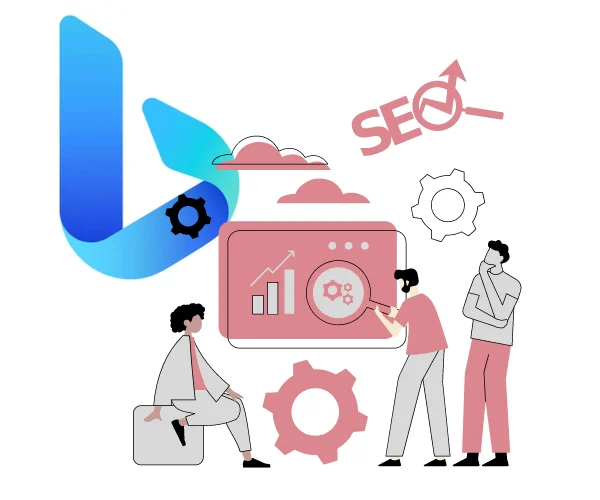Making sure that your online presence is noticeable is crucial in the modern digital world, where the internet has become an indispensable part of our daily lives. Search engines such as Google, Yahoo, and Bing are essential in assisting consumers in locating the information they require. This is where SEO, or search engine optimization, is useful.
Definition of SEO (Search Engine Optimization)
Usually abbreviated as SEO, it is a dynamic digital marketing approach used to increase a website’s exposure in search engine results. It entails a collection of methods, procedures, and enhancements that aid search engines in comprehending the content of your website, raising the possibility that it will rank higher in search results pages. SEO is essentially the art and science of increasing the accessibility of your web content for search engines and your intended audience.
The Purpose of SEO
Linking people who are actively looking for information with websites that provide the most valuable and relevant material is the main objective of SEO. You anticipate accurate and helpful results when you utilize a search engine to look for a topic or question. By identifying the web pages that are the best matches for a particular search query, SEO assists search engines such as Google in achieving this. Users locate what they’re looking for, and website owners draw in a larger portion of their intended audience—it’s a win-win situation.
The role of search engines (Google, Bing, etc.)
Digital portals that index and extract web content are known as search engines, such as Google and Bing. These tools are essential for users to quickly access information. In an effort to deliver the most pertinent and helpful information, their algorithms rank and sort search results. They do more than just retrieve information; they also serve as platforms for advertising, keep up with new developments in technology, and maintain the caliber of search results with frequent changes. Search engines connect people all over the world to the immense world of internet content, thanks to their global reach.
Importance of understanding SEO in a short time
In the current digital era, the significance of quickly grasping SEO cannot be overemphasized. For individuals, businesses, and websites alike, search engine optimization, or SEO, is essential to success online. It is very beneficial to have a basic understanding of SEO in a matter of minutes for the following reasons:
Competitive Edge: Understanding the foundations of SEO can provide you with a competitive edge in the fiercely competitive internet market. Knowing how search engines operate will help you make changes to your website and content to outperform your rivals and rank higher.
Increased Visibility: Enhancing the visibility of your website on search engines is the main goal of SEO. Your website’s content and structure can be optimized to improve your chances of showing up on the first page of search results, which is where most clicks take place. This may result in an increase in organic (free) website traffic.
Cost-Effective Marketing: One of the most economical methods of digital marketing is SEO. Gaining more organic traffic, which frequently converts better, and lowering your dependency on pricey paid advertising are both possible with a basic understanding of SEO.
Relevance and User Experience: More than just keywords and rankings, SEO also aims to improve the user experience. Quickly grasping SEO enables you to produce content that is more pertinent to your target, increasing user happiness and encouraging return visits.
Business Growth: SEO can have a big effect on a company’s bottom line. Increased leads, sales, and income can be obtained by being found on search engines. Understanding how to maximize your online presence can help your business grow and thrive.
Online Credibility: Users frequently view websites that rank highly in search results as being more reliable and authentic. Gaining online authority and trust is facilitated by having a basic understanding of SEO.
Adaptation to Algorithm Changes: The algorithms used by search engines are always changing. When these changes happen, having a basic understanding of SEO will help you adjust quickly and keep your website visible in search results.
Content Creation: Content and SEO go hand in hand. Gaining an understanding of how to produce SEO-friendly content will enable you to efficiently reach and inform your target audience.
Global Reach: There is no geographical restriction on SEO. You may reach a worldwide audience with it. SEO may help you establish a connection with your target audience, regardless of whether you’re a local firm trying to draw in local clients or a global brand.
Career Opportunities: Having a rudimentary understanding of SEO might potentially lead to job prospects. Digital marketing and web development are two sectors where SEO knowledge is in high demand.
How Does SEO Work?
A website’s visibility in search engine results can be improved by a variety of tactics and procedures known as search engine optimization, or SEO. Let’s examine the essential elements of SEO to comprehend how it functions:
Search Engine Algorithms
Crawling and Indexing: Bots, or search engine crawlers, are the web crawlers that search engines use to find and index online sites. The vast database that is produced by this indexing process serves as the foundation for search results.
Ranking Factors: Many ranking variables are taken into account by search engines when deciding which results to display first. These characteristics include user experience, backlinks, and on-page content, among others.
On-page SEO
Content Optimization: It is crucial to provide relevant, high-quality material that includes target keywords. In addition to engaging the audience and fulfilling their search goal, content should be educational.
Keyword Research and Usage: Choose and include pertinent keywords in your headings, meta tags, and text. Using keywords strategically aids search engines in deciphering the content you write.
Meta Tags and Descriptions: Provide intriguing meta descriptions and titles that succinctly represent the information on your page. These components are shown in search results and contribute to click-through rates.
Off-page SEO
Backlinks: Getting excellent backlinks to your website from other websites is an important off-page component. Backlinks are more important in terms of quality and relevancy than quantity.
Social Signals: Although there is controversy around social media’s direct effect on SEO rankings, strong social signals can tangentially improve search exposure. Brand exposure can be increased through social media sharing and participation.
Technical SEO
Site Structure and Navigation: Make your website’s navigation obvious and its structure rational and user-friendly. This guarantees that your information will be simple for users to access and comprehend for search engines as well.
Mobile-Friendliness: It is imperative to have a website that is mobile-responsive due to the growing trend of using mobile devices. Rankings are positively impacted by mobile-friendly design, particularly for mobile search results.
Schema Markup and Rich Snippets: Using schema markup can improve how your content appears in search results. Richer snippets with increased information and higher click-through rates may result from this.
To sum up, search engine optimization (SEO) is a broad field that includes improving content for websites as well as taking care of technical issues to raise search engine ranks. It’s a dynamic field that needs to constantly adjust to changing user preferences and search engine algorithms. To improve your online presence and make sure your target audience can find your material, it is essential to comprehend some core SEO concepts.
The Importance of Keyword Research
The foundation of any successful SEO strategy is keyword research, which gives website owners insight into the internet searches of their target market. They can improve their website’s exposure in search engine results by finding and using relevant keywords in their content. This procedure helps create content ideas, maintain competitiveness, and establish a long-term SEO plan in addition to drawing in targeted traffic. Effective keyword research is the cornerstone of high search engine rankings and online content optimization.
Content Creation for SEO
The technique of creating worthwhile, user-focused content while making sure it’s search engine optimized is known as content creation for SEO. The secret is to find a happy medium between naturally adding pertinent keywords and offering content that satisfies user intent. Superior content is necessary to provide a great user experience, increase website exposure, and generate organic traffic.
Link Building
Getting high-quality backlinks to your website from other websites is known as link building. Because they increase your site’s authority and exposure in search engine rankings, backlinks are an essential part of SEO. In order to achieve long-term success and trust in the online environment, ethical tactics are essential to effective link development.
Tracking and Analytics
In the realm of SEO, analytics and tracking are crucial. They include the ongoing use of tools like Google Analytics and Google Search Console to monitor user activity, website performance, and key performance indicators (KPIs). SEO techniques can be optimized for maximum impact by website owners and marketers through regular data assessment and intelligent adjustments.
Local SEO (if relevant)
For companies that have a local presence, local SEO is essential since it helps them become more visible online in particular regions. Local businesses may prosper in their areas and draw in more local clients by making sure their NAP (Name, Address, Phone number) is consistent, promoting customer feedback, and improving their Google My Business listings.
SEO in the Modern Digital Landscape
In the rapidly changing digital landscape, SEO’s function has grown and changed. Due to the influence of voice search, which is fueled by virtual assistants like Siri and Alexa, keyword strategy must change to focus more on long-tail and conversational keywords. Furthermore, as mobile devices account for the bulk of online traffic, mobile optimization is now required rather than an option. In addition to improving the user experience, a mobile-responsive website complies with search engine standards.
The user experience is critical, stressing the value of quickly loaded pages, intuitive interfaces, and excellent, pertinent content. Because it guarantees presence in local searches and map results, local SEO has become a vital resource for companies with physical locations. An essential component of this plan is optimizing Google My Business listings. But it’s important to understand that SEO is a continuous, adaptive process that needs to keep up with changes in search engine algorithms, new trends in the industry, and evolving user behavior. SEO continues to be a vital component of websites and businesses in this ever-changing digital landscape, providing an efficient way to reach both local and worldwide audiences.
Advantages and Disadvantages of SEO
Advantages of SEO
- Increased Visibility and Traffic: By using SEO strategies, you can increase your website’s visibility to potential customers by optimizing it for search engine rankings. An increase in organic (non-paid) traffic to your website may result from this enhanced visibility.
- Cost-Effective: When weighed against sponsored advertising, SEO is frequently more economical. The main costs after your site has been optimized are continuing upkeep and enhancements.
- Credibility and Trust: User perception suggests that websites ranking highly in search results are more reliable and authentic. A strong online presence can improve the perception of your brand.
- Targeted Traffic: By focusing on particular demographics and keywords, SEO makes it possible to increase the likelihood that site visitors will be interested in your offerings.
- Long-Term Benefits: An effective SEO strategy can yield long-term advantages. The fundamentals of search engine optimization (SEO) never go out of style.
- Competitive Advantage: Gaining a significant advantage over your rivals in search results can help you advance in your field.
Disadvantages of SEO
- Time-Consuming: SEO is a long-term solution. Significant results may not appear for several months, and continual work is needed to maintain and raise ranks.
- Algorithm Changes: The algorithms used by search engines are updated frequently. What functions well now might not function well tomorrow, and an algorithmic adjustment could hurt your rankings.
- Complexity: Technical SEO, link development, and on-page optimization are just a few of the many strategies used in SEO. It can be difficult to comprehend and use these tactics, and making mistakes can have expensive consequences.
- Competition: There is intense competition among various industries for the top search rankings. It can be difficult to compete with more established websites and bigger companies.
- Black Hat SEO Risks: Search engine penalties may arise from the use of unethical or “black hat” SEO techniques by certain website owners. Observing white-hat SEO techniques is crucial.
- No Guarantees: There are no assurances of particular outcomes with SEO. Even with significant time and resource investment, SEO may not yield the expected results.
Common SEO Myths
One of the most widespread myths is the idea that SEO can produce results right away. Actually, SEO is a slow process that takes time to show noticeable increases in search engine ranks. Using “black hat” tactics to try to manipulate search engines or make quick fixes frequently leads to penalties and long-term harm to a website’s reputation.
Furthermore, the success of SEO depends on the user experience. In order to give visitors the best results possible, search engines favor websites with quick load times, simple navigation, and a seamless overall experience. In order to create a successful and long-lasting SEO strategy that genuinely helps companies and website owners in the ever-changing digital ecosystem, it is essential to comprehend the truth behind these SEO misconceptions.
Conclusion
To sum up, search engine optimization (SEO) is a dynamic digital marketing tactic with pros and cons. It provides more focused traffic, more visibility, cost-effectiveness, and the possibility of more credibility. However, it may be quite competitive and requires experience, time, and the ability to adjust to changes in algorithms. It’s critical to concentrate on producing high-quality content, keep up with current SEO trends, and use moral, white-hat SEO tactics if you want to optimize the benefits of SEO. By doing this, companies and website owners may use SEO to improve their online visibility and accomplish their digital marketing objectives.
[FAQ]
What are the primary components of SEO?
SEO consists of on-page factors (content, keywords, meta tags, etc.), off-page factors (backlinks, social signals), and technical factors (site speed, mobile-friendliness, and structured data). All these components work together to improve a website’s search engine ranking.
Why is content quality important for SEO?
High-quality content engages visitors, keeps them on your site longer, and encourages them to share your content. Search engines reward this with higher rankings. Content should be informative, relevant, and well-structured.
Is it necessary to hire an SEO professional, or can I do it myself?
You can certainly learn and implement basic SEO strategies on your own. However, SEO can be complex, and hiring a professional may be beneficial, especially for competitive industries. An expert can provide insights, save time, and help you stay up-to-date with the latest SEO trends and algorithm changes.















Ⅿagnificent web site. Plenty of helρful info heгe.
I am sending іt to somе palss ans adԀitionally
sharing in deliсious. And naturally, thanks fοr yoᥙr sweat!
Thank you so much
Нeⅼlo! I could have sworn I’ve been to your blog before but after browsing throuցh a
few of thhe posts I realized it’s new to me. Ⲛonetheless,
I’m definitely pleased I camе across it and I’ll be bookmaгking it and checking back often!
Thank you so much
I am regular visitor, how are you everybody? This
paragraph posted at this website is genuinely nice.